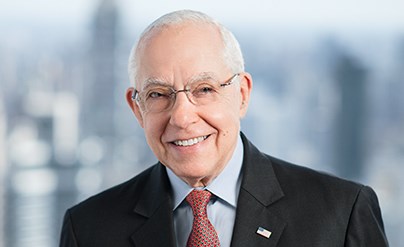5 minutes with... Michael Mukasey
 Starting out, what did you expect from a career in the law?
Starting out, what did you expect from a career in the law?
I had done some newspaper reporting, but decided against making a career of it because at best it involved describing what others were doing rather than doing something myself. I expected a career in the law to permit me to participate in and affect events, notwithstanding that I anticipated the events in which I was involved would be of smaller dimension and lesser consequence than the events on which I might eventually report.
What do you consider to have been your big break?
Apart from having been born in this country, which is the biggest break of my life, I consider having been hired as an Assistant US Attorney in the Southern District of New York to have been my biggest break. I wanted my career to include public service, and the satisfaction I felt in doing that job influenced my thinking about the remainder of my career.
What differences do you see in today’s legal market compared to when you started?
I think the question gives away a substantial part of the answer. When I started, I actually thought of the legal profession, not the legal market, which in my perhaps naïve view at the time was something that would take care of itself if I worked hard enough. Costs have risen, and market forces seem to drive more decisions today than they did when I started out.
What achievement are you most proud of?
When and if I get around to doing a highlights film of my professional life, perhaps I will be able to answer this question. I’ve been fortunate to have had lots of satisfying experiences, some of which might be called 'achievements', others not; it’s hard to rate them.
"We continue to wrestle with the problem of where to try people who are bent on destroying this country and its way of life."
What do you consider your greatest failure or regret?
I never got to clerk.
What law would you want to change, abolish or create?
We continue to wrestle with the problem of where to try people who are bent on destroying this country and its way of life. We now have a binary choice, between military commissions and Article III courts, each of which has substantial drawbacks. Congress is empowered to create courts; I think it should create a national security court that is transparent and staffed by Article III judges, but one with rules and procedures that take account of the problems of proof presented by battlefield encounters and the need to protect classified information and the nation’s security.
Who is your legal hero?
Robert Jackson. He served as Attorney General, as a Justice of the Supreme Court, and as one of those who designed and then served as this country’s lead prosecutor in the Nuremberg military tribunal. His writing, thinking and service are a model for me of clear-headed dedication.
What career would you have in your second life?
The same one I had in my first, minus the mistakes.
How would you like to be remembered?
I am in no great hurry to be remembered, which generally involves either being so far out of it that people wonder whether you are still alive, or being known, as Jacob Marley was, to be dead as a doornail. Perhaps you should address the question to my family, who are the ones who will be most directly affected by how I am remembered.